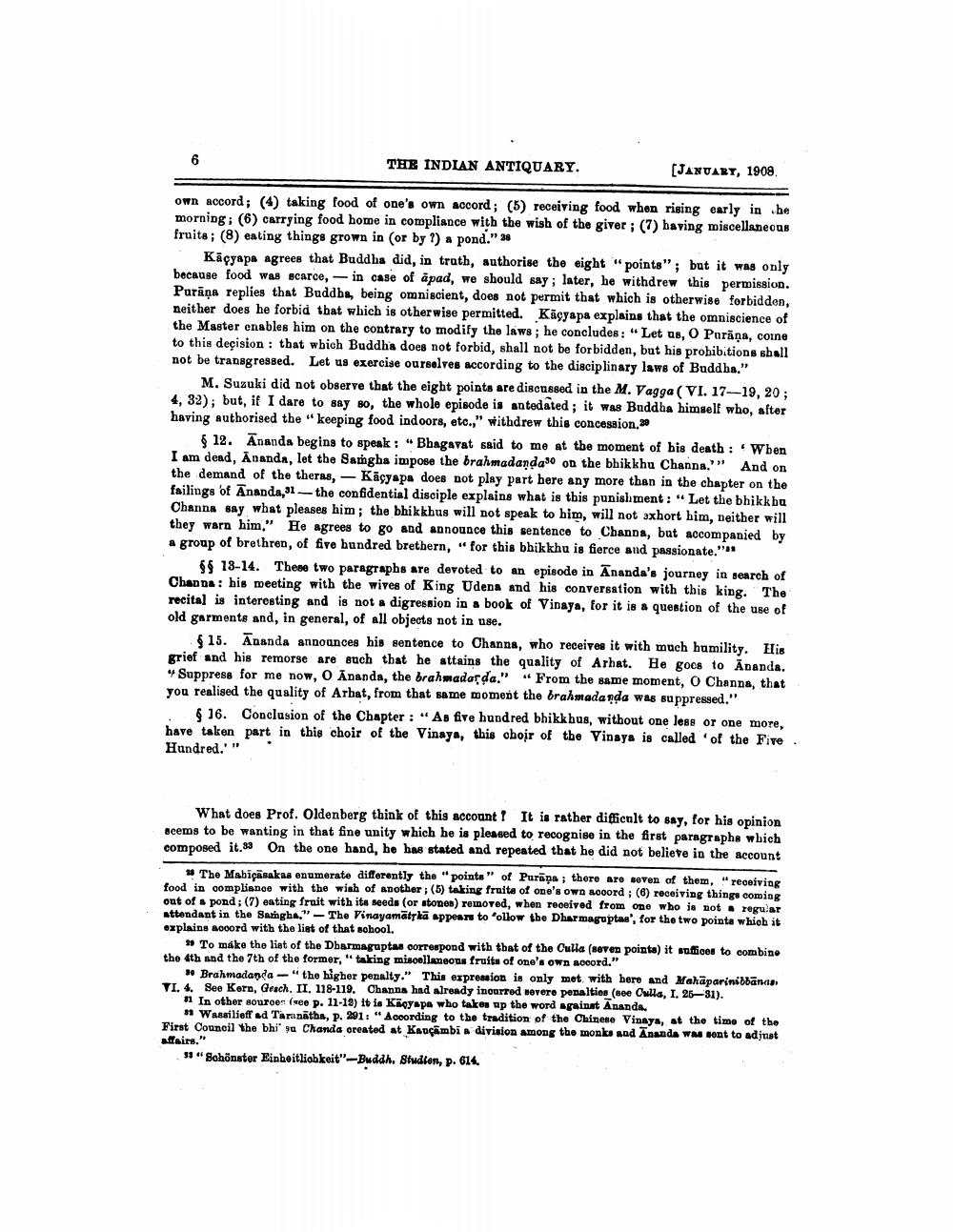________________
THE INDIAN ANTIQUARY.
(JANUARY, 1908
own accord; (4) taking food of one's own accord; (5) receiving food when rising early in be morning: (6) carrying food home in compliance with the wish of the giver ; (7) having miscellaneous fruits ; (8) eating things grown in (or by ?) a pond." 28
Kāçyapa agrees that Buddha did, in truth, authorise the eight "points"; but it was only because food was scarce, in case of apad, we should say ; later, he withdrew this permission. Parāna replies that Buddbe, being omniscient, does not permit that which is otherwise forbidden, neither does he forbid that which is otherwise permitted. Kägyapa explains that the omniscience of the Master enables him on the contrary to modify the laws; he concludes : "Let us, O Porāna, coine to this decision : that which Buddha does not forbid, shall not be forbidden, but his prohibitions shall not be transgressed. Let us exercise ourselves according to the disciplinary laws of Buddha."
M. Suzuki did not observe that the eight points are discussed in the M. Vagga (VI. 17--19, 20; 4, 32); but, if I dare to say so, the whole episode is antedated; it was Buddha himself who, after having authorised the keeping food indoors, etc.," withdrew this concession.20
12. Ananda begins to speak : Bhagavat said to me at the moment of his death: When I am dead, Ananda, let the Samgha impose the brahmadandaso on the bhikkhu Channa.'” And on the demand of the theras, - Käsy pa does not play part here any more than in the chapter on the failings of Ananda,1 - the confidential disciple explains what is this punishment : "Let the bhikkbu Channa say what pleases him; the bhikkhus will not speak to him, will not axhort him, Deither will they warn him." He agrees to go and announce this sentence to Channa, but accompanied by a group of brethren, of five hundred brethern, " for this bhikkhu is fierce and passionate."
$$ 13-14. These two paragraphs are devoted to an episode in Ananda's journey in search of Chanda: his meeting with the wives of King Udena and his conversation with this king. The recital is interesting and is not a digression in a book of Vinaya, for it is a question of the use of old garments and, in general, of all objects not in 186.
$15. Ananda announces his sentence to Channa, who receives it with much humility. His grief and his remorse are such that he attains the quality of Arhat. He goes to Ananda.
Suppress for me now, O Ananda, the brahmadarda." "From the same moment, O Channa, that you realised the quality of Arbat, from that same moment the brahmadanda was suppressed."
16. Conclusion of the Chapter: "As five hundred bhikkhus, without one less or one more, have taken part in this choir of the Vinaya, this choir of the Vinaya is called of the Five Hundred.'"
What does Prof. Oldenberg think of this account ! It is rather difficult to say, for his opinion seems to be wanting in that fine unity which he is pleased to recognise in the first paragraphs which composed it.83 On the one hand, bo has stated and repeated that he did not believe in the account
The Mabiçãsakas enumerate differently the "points" of Purapa; there are seven of them, "receiving food in compliance with the wish of another; (5) taking fruits of one's own scoord(6) receiving things coming out of pond: (7) onting fruit with its seeds (or stonon) removed, when received from one who is not regular attendant in the Sangba." -The Vinayamatskā appears to 'ollow the Dharmaguptas, for the two points which it explains accord with the list of that sohool.
» To make the list of the Dharmaguptas correspond with that of the Oulla (soven points) it offices to combine the 4th and the 7th of the former, taking miscellaneous fruits of one's own accord."
** Brahmadanda "the higher penalty." This expression is only met with bore and Mahäparinibbancis VI. 4. See Korn, Gesch. II. 118-119. Channa had already incurred severo penalties (see Oulla, I. 26-31).
In other sourcen (see p. 11-18) It is Kaoy pa who takes up the word against Ananda * Wassilioff ad Tarunatha, p. 291: "According to the tradition of the Chinese Vinaya, at the time of t. First Council the bhi' ya Chanda oreated at Kauçãmbi a division among the monks and Ananda was sent to adjust
53 "Sohönster Einbeitlichkeit"-Buddh. Studien, p. 614.




